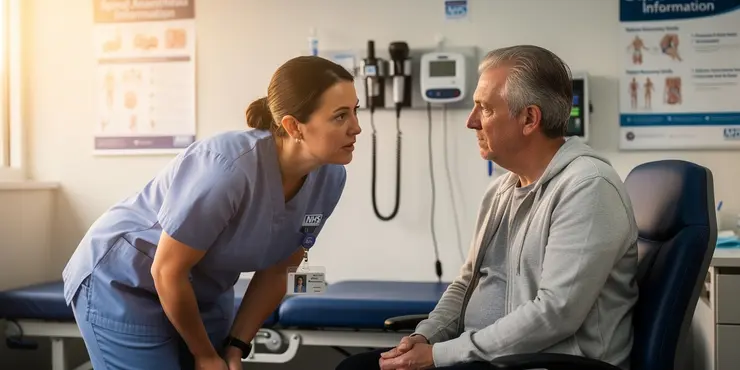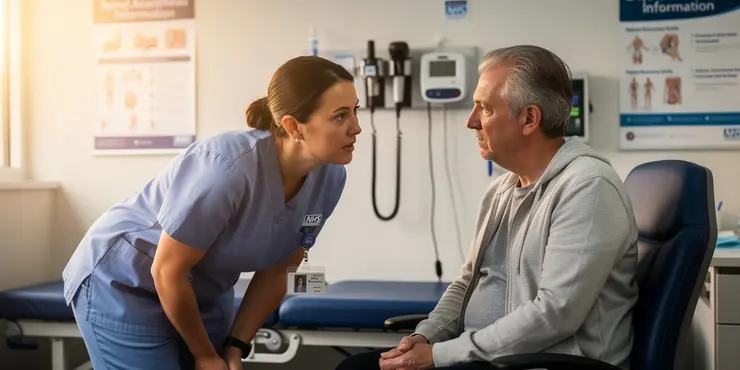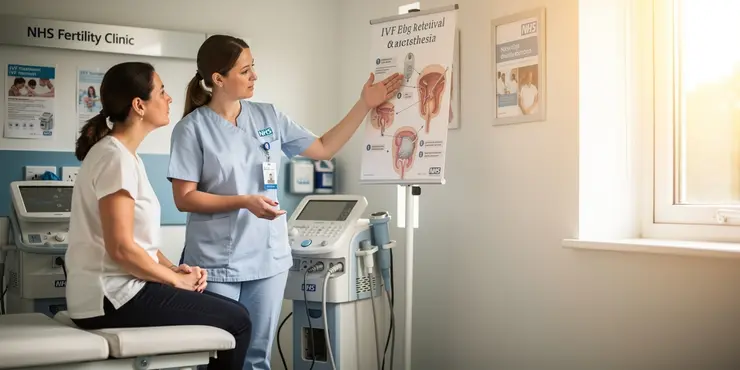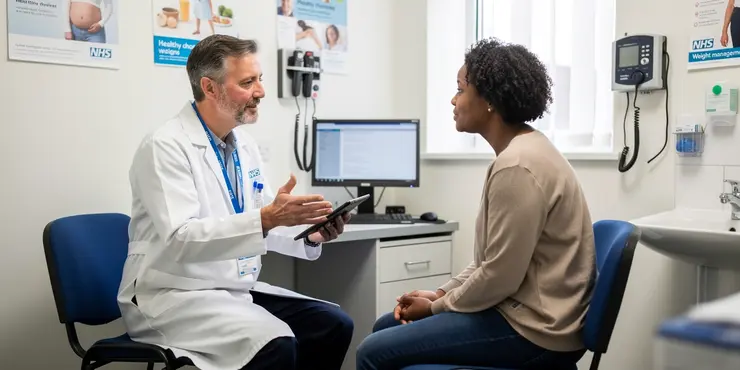
Find Help
More Items From Ergsy search
-

What are the common side effects of spinal anaesthesia?
Relevance: 100%
-

What is spinal anaesthesia?
Relevance: 78%
-

Spinal Anaesthesia for Caesarean Section
Relevance: 75%
-

Is spinal anaesthesia safe for a Caesarean section?
Relevance: 72%
-

How will I be positioned for spinal anaesthesia?
Relevance: 70%
-

How is spinal anaesthesia different from an epidural?
Relevance: 67%
-

What should I expect after the spinal anaesthesia wears off?
Relevance: 63%
-

What should I do to prepare for spinal anaesthesia?
Relevance: 62%
-

Can I breastfeed immediately after a Caesarean section under spinal anaesthesia?
Relevance: 56%
-

What type of anaesthesia is used during hip replacement surgery?
Relevance: 50%
-

Are there any common side effects of Mounjaro?
Relevance: 44%
-

What are the common side effects of vaccines?
Relevance: 44%
-

What are the common side effects of Abiraterone?
Relevance: 44%
-

What are common side effects of Wegovy?
Relevance: 43%
-

What are the common side effects of ketamine?
Relevance: 43%
-

What are common side effects of Baxdrostat?
Relevance: 43%
-

What are the common side effects of Ozempic?
Relevance: 43%
-

What are common side effects of antibiotics?
Relevance: 43%
-

What are common side effects of Ozempic?
Relevance: 43%
-

What are common side effects of CBD?
Relevance: 43%
-

Are there any common side effects of GLP-1 medications?
Relevance: 41%
-

What are the common side effects after a facelift?
Relevance: 40%
-

What are common side effects of weight loss drugs?
Relevance: 39%
-

Is insomnia a common side effect of weight loss drugs?
Relevance: 37%
-

Are headaches a common side effect of weight loss medications?
Relevance: 37%
-

Does IVF require anesthesia?
Relevance: 37%
-

What are the side effects of Botox?
Relevance: 36%
-

What are the known side effects of ketamine usage?
Relevance: 36%
-

What are the side effects of Ozempic?
Relevance: 36%
-

What are the side effects of Paracetamol?
Relevance: 35%
-

What are the side effects of Botox?
Relevance: 35%
-

Are there common side effects that fake weight loss drugs may cause?
Relevance: 35%
-

Anaesthetic procedure for elective caesarean section (C section)
Relevance: 35%
-

What are the side effects of Ibuprofen?
Relevance: 35%
-

What are the side effects of Aspirin?
Relevance: 35%
-

What are the less common but serious side effects of weight loss drugs?
Relevance: 34%
-

What are the common side effects of Wegovy tablets?
Relevance: 34%
-

What are the side effects of Paillon treatment?
Relevance: 34%
-

Are there any side effects to the flu vaccine?
Relevance: 33%
-

What are the side effects of bowel cancer treatment?
Relevance: 33%
Introduction
Spinal anaesthesia is a common procedure in the UK for surgeries involving the lower body, such as hip, knee, and lower abdominal surgeries. While generally safe, like all medical procedures, it is associated with certain side effects. Understanding these side effects can help patients prepare for and manage potential outcomes effectively.
Common Side Effects
Most patients undergoing spinal anaesthesia can expect some typical side effects, although they vary in severity and duration among individuals. These side effects are usually temporary but should be monitored by medical professionals.
Headache
A post-dural puncture headache (PDPH) is one of the most common side effects following spinal anaesthesia. This occurs due to leakage of cerebrospinal fluid from the puncture site, leading to a decrease in pressure around the brain. The headache can range from mild to severe and is often felt when sitting or standing. Treatment may include rest, hydration, caffeine, and in some cases, an epidural blood patch.
Low Blood Pressure
Another frequent side effect is a drop in blood pressure caused by the block of sympathetic nerves. This can lead to symptoms like nausea, dizziness, or lightheadedness. To mitigate this, intravenous fluids or medications are often administered to maintain stable blood pressure levels throughout the procedure.
Nausea and Vomiting
Nausea and vomiting can accompany low blood pressure or can occur independently. These symptoms are usually transient and can be managed effectively with antiemetic medications if necessary.
Backache
A minor backache is a relatively common complaint following spinal anaesthesia. This can result from the needle puncture or the positioning on the operating table. Generally, this discomfort is mild and can be alleviated with pain relievers or gentle physical activity.
Transient Neurological Symptoms
In some instances, patients may experience transient neurological symptoms (TNS) which can include pain or a tingling sensation in the buttocks and legs. While these symptoms are rare, they resolve without treatment in most cases within a few days.
Urinary Retention
Spinal anaesthesia can temporarily affect bladder function, leading to urinary retention. This is common during the initial hours following surgery. In some cases, catheterisation may be necessary until normal bladder function resumes.
Itching
Itching, particularly if opioids were used in conjunction with spinal anaesthesia, is another potential side effect. This usually resolves quickly and can be managed with antihistamines if needed.
Conclusion
While spinal anaesthesia is generally safe, it is essential for patients to be informed about potential side effects. Communicating any discomfort or unusual symptoms to healthcare providers promptly ensures effective management and care, ensuring a smoother recovery process.
Introduction
Spinal anaesthesia is a way to numb the lower part of your body during surgery. It is often used in the UK for surgeries on the hip, knee, or tummy. It is usually safe, but some side effects can happen. Knowing about these side effects helps you get ready and deal with them.
Common Side Effects
Many people have some side effects after spinal anaesthesia. They can be different for everyone. They usually don't last long, but doctors should keep an eye on them.
Headache
After spinal anaesthesia, some people get a headache. This is called a post-dural puncture headache. It happens because fluid leaks at the puncture site, decreasing pressure around the brain. The headache can be mild or strong, especially when sitting or standing. You can treat it with rest, drinking water, caffeine, and sometimes an epidural blood patch.
Low Blood Pressure
Spinal anaesthesia can also lower blood pressure. This might make you feel sick, dizzy, or light-headed. To help with this, doctors often give fluids or medicine to keep your blood pressure stable.
Nausea and Vomiting
You might feel sick to your stomach or vomit. This can happen with low blood pressure or on its own. These feelings usually don't last long and can be treated with medicine if needed.
Backache
Some people have a backache after the procedure. This can be because of the needle or how you lay on the table during surgery. The backache is usually mild and goes away with pain medicine or light exercise.
Transient Neurological Symptoms
Sometimes, you might feel pain or tingling in your bottom or legs. This is called transient neurological symptoms (TNS). It's rare and usually goes away on its own in a few days.
Urinary Retention
Spinal anaesthesia can make it hard to pee at first. This is common right after the surgery. Sometimes, a tube (catheter) might be needed until you can pee normally again.
Itching
If spinal anaesthesia is used with opioids, it might make you itch. This goes away quickly and can be treated with antihistamines if needed.
Conclusion
Spinal anaesthesia is generally safe. It is important to know about the possible side effects. Tell your doctor if you feel any discomfort or if something feels wrong. This way, they can help you recover easily and quickly.
Frequently Asked Questions
What is a common side effect of spinal anesthesia?
A common side effect of spinal anesthesia is a drop in blood pressure.
Can spinal anesthesia cause headaches?
Yes, headaches can occur after spinal anesthesia, often referred to as a spinal headache.
Is nausea a side effect of spinal anesthesia?
Yes, nausea and vomiting can be side effects of spinal anesthesia.
Do patients experience back pain after spinal anesthesia?
Some patients may experience back pain at the injection site temporarily after spinal anesthesia.
Can spinal anesthesia cause urinary retention?
Yes, urinary retention can occur as a side effect of spinal anesthesia.
What is transient neurological syndrome related to spinal anesthesia?
Transient neurological syndrome is a condition characterized by pain and discomfort in the buttocks and thighs after spinal anesthesia.
How long do the side effects of spinal anesthesia last?
Most side effects such as headache or nausea typically resolve within a few days after the procedure.
Can spinal anesthesia lead to nerve injury?
Nerve injury is very rare but can occur as a complication of spinal anesthesia.
Are there any allergic reactions to spinal anesthesia?
Allergic reactions are extremely rare with spinal anesthesia but can include rash or itching.
Can spinal anesthesia cause shivering or chills?
Yes, shivering or chills can occur as a side effect of spinal anesthesia.
Is dizziness a possible side effect of spinal anesthesia?
Yes, dizziness can be a side effect, often related to low blood pressure.
Does spinal anesthesia affect breathing in any way?
Spinal anesthesia may cause a sensation of difficulty breathing, but it usually does not affect breathing significantly.
Are there any cardiovascular risks associated with spinal anesthesia?
There is a risk of cardiovascular effects such as changes in heart rate or blood pressure.
Can patients experience itching after spinal anesthesia?
Yes, itching is a potential side effect, especially when opioids are used in conjunction.
What are the signs of a spinal headache?
A spinal headache is usually characterized by a dull, throbbing pain that is worse when sitting or standing and improves when lying down.
How is a spinal headache treated?
Treatment may involve bed rest, hydration, pain relievers, caffeine, or possibly an epidural blood patch.
Is it normal to feel numbness after spinal anesthesia?
Numbness and reduced sensation are normal for the duration of the anesthetic effect but should resolve after a few hours.
Can spinal anesthesia cause infections?
Infections at the site of injection or deeper are very rare but possible complications.
What should patients do if side effects persist?
Patients should contact their healthcare provider if side effects persist or worsen after spinal anesthesia.
How can the risk of side effects from spinal anesthesia be minimized?
The risk can be minimized by ensuring the anesthesia is performed by a skilled professional, proper patient monitoring, and addressing side effects promptly.
What can happen after getting spinal anesthesia?
When you have spinal anesthesia, it can sometimes make you feel sick or dizzy. This is something that happens a lot and is normal. If you feel sick, tell the person helping you so they can help you feel better. You can use things like deep breathing or listen to calming music to help feel more comfortable.
When you get spinal anesthesia, sometimes your blood pressure can go down. This is normal.
Can spinal anesthesia cause headaches?
Spinal anesthesia is a medicine that makes you numb so you don’t feel pain during an operation. Sometimes, after getting spinal anesthesia, people might get a headache.
If you have a headache after spinal anesthesia, tell a doctor or nurse. They can help you feel better.
Some things that can help with headaches are:
- Resting in a quiet, dark room
- Drinking lots of water
- Taking medicine that a doctor gives you
Ask someone you trust to help you if you have questions.
Yes, you can get a headache after spinal anesthesia. This is often called a spinal headache.
Can spinal anesthesia make you feel sick?
Yes, feeling sick and throwing up can happen after getting spinal anesthesia.
Do people have back pain after spinal anesthesia?
When doctors use spinal anesthesia, they give medicine in your back to make you numb for surgery.
Sometimes, people might feel back pain after having spinal anesthesia.
If you have back pain, tell a doctor or nurse. They can help you feel better.
Using a cushion or taking a gentle walk might also help ease the pain.
Some people might feel back pain where the needle went in after getting a spinal injection. This pain usually doesn't last long.
Can spinal anesthesia make it hard to pee?
Yes, sometimes people can have trouble peeing after a spinal anesthetic. This is because the numbing medicine can make it hard for the bladder to work well.
What is Transient Neurological Syndrome after Spinal Anesthesia?
Transient Neurological Syndrome is a temporary problem that can happen after spinal anesthesia. Spinal anesthesia is when doctors use medicine to make you numb during surgery so you don't feel pain.
Sometimes, after this, a person might feel strange or painful feelings in their legs or back. But don't worry! This usually goes away on its own.
If you have questions or feel worried, tell a doctor or nurse. They can help explain things to you and make sure you feel better.
It can help to write down anything you feel or notice. This way, you can remember to tell the doctor everything when you see them.
Transient neurological syndrome is a problem that happens when you feel pain and discomfort in your bottom and legs after having a special type of medicine called spinal anesthesia.
How long do the effects of spinal anesthesia last?
When you get spinal anesthesia, you might feel some things like tingling or numbness. Most of these feelings go away in a few hours. But sometimes, they can last a bit longer.
Here are some tips to help:
- Ask your doctor for help.
- Rest in a comfy place.
- Drink plenty of water.
Most side effects like headache or feeling sick go away a few days after the procedure.
Can spinal anesthesia hurt nerves?
Nerve damage almost never happens, but it can sometimes happen after spinal anesthesia.
Can you be allergic to spinal anesthesia?
Spinal anesthesia is a medicine that stops you from feeling pain during some operations.
Sometimes, people can be allergic to it. An allergy is when your body doesn't like something and reacts to it.
If you are worried, you can talk to a doctor or nurse. They can help you understand and feel better.
Here are some things that might help:
- Ask a friend or family member to come with you to appointments.
- Write down any questions you have before seeing the doctor.
- If you have trouble remembering what was said, ask if you can record the conversation.
Getting an allergic reaction from spinal anesthesia almost never happens. But if it does, you might get a rash or feel itchy.
Can spinal anesthesia make you shiver or feel cold?
Yes, sometimes your body might shake or feel very cold after getting a spinal injection. This is normal and can happen as a side effect.
Can spinal anesthesia make you feel dizzy?
Yes, sometimes people feel dizzy. This can happen because their blood pressure is low.
Can the medicine for numbing the spine change how you breathe?
When doctors use special medicine to make part of your body numb, it's called spinal anesthesia. This helps during some surgeries to stop you from feeling pain. Some people wonder if it changes how you breathe.
Here’s what you can do if you’re worried about this:
- Ask your doctor to explain how the medicine works.
- Use pictures or videos to help understand.
- Bring someone with you to take notes.
It’s important to talk to your doctor if you’re scared or have questions.
Spinal anesthesia might make it feel a little hard to breathe, but it usually does not cause big problems with breathing.
Does spinal anesthesia affect the heart?
Spinal anesthesia is medicine that makes part of your body numb for an operation.
Sometimes, it can affect your heart and blood.
Doctors will watch you closely to keep you safe.
If you have questions, you can ask your doctor.
If words are hard to understand, using pictures or asking for help might be useful.
Your heart might beat faster or slower, or your blood pressure could change.
Can people feel itchy after getting medicine in their spine?
Sometimes, people feel itchy after doctors use a special medicine for surgery. This medicine goes in the back to stop pain. If you feel itchy, tell your doctor. They can help you feel better.
Yes, feeling itchy can happen, especially if you take medicine called opioids.
What are the signs of a spinal headache?
A spinal headache is a kind of headache that can happen after you have had a needle in your back. Here are some signs you might have a spinal headache:
- You have a headache that gets worse when you sit up or stand.
- The headache gets better when you lie down.
- You might feel sick and want to throw up.
- Your neck could feel stiff or sore.
- You might feel dizzy or have blurred vision.
If you think you have a spinal headache, tell an adult or doctor. They can help you feel better.
A spinal headache is a type of headache that feels dull and throbbing. It gets worse when you sit or stand up. It feels better when you lie down.
How do you feel better after a spinal headache?
A spinal headache can happen after certain medical treatments. Here are simple steps and tools to help feel better:
- Rest: Lie down and try to stay calm.
- Drink fluids: Water and other drinks can help you feel good.
- Medications: Ask a doctor about safe medicines to stop the pain.
- Caffeine: Drinks like coffee or tea might help reduce the headache.
- Supportive pillows: Use a pillow to keep your head comfy when you lie down.
If the headache doesn't go away, visit a doctor for more help.
You might need to rest in bed, drink lots of water, and take medicine for pain. Drinking caffeine can also help, like having coffee or tea. If it doesn't get better, the doctor might do a special treatment called an epidural blood patch.
Is it normal to feel numb after getting a spinal anesthetic?
It is normal to feel numb for a few hours after getting medicine that makes you numb. The feeling should come back after a few hours.
Can spinal anesthesia make you sick with an infection?
Getting an infection where you had your shot is very rare, but it can happen.
What to do if side effects don't go away?
If you still feel unwell after taking medicine, tell a grown-up or a doctor. They can help you. It's important to talk to someone who knows about health.
You can also:
- Write down how you feel. This can help the doctor understand.
- Ask someone to go with you to see the doctor. They can help you remember what the doctor says.
If you have spinal anesthesia and feel bad afterwards, you should tell your doctor. It is important to get help if you still feel bad after a while or if you start to feel worse.
How can we lower the chance of problems from spinal anesthesia?
Spinal anesthesia can make you numb for surgery. But sometimes, it can cause problems. Here are ways to lower those risks:
- Talk to Your Doctor: Tell your doctor about your health. This helps them know what's best for you.
- Follow Directions: Listen to what the doctors and nurses say before and after your surgery.
- Stay Still: When they give the anesthesia, try to stay as still as you can.
- Drink Water: Drinking water after can help you feel better.
These steps can help make side effects less likely.
We can make the risk smaller by doing some important things. First, make sure a trained doctor gives the sleepy medicine (anesthesia). Second, watch the patient carefully while they sleep. Third, help quickly if there are any problems.
Useful Links
This website offers general information and is not a substitute for professional advice.
Always seek guidance from qualified professionals.
If you have any medical concerns or need urgent help, contact a healthcare professional or emergency services immediately.
Some of this content was generated with AI assistance. We’ve done our best to keep it accurate, helpful, and human-friendly.
- Ergsy carfully checks the information in the videos we provide here.
- Videos shown by Youtube after a video has completed, have NOT been reviewed by ERGSY.
- To view, click the arrow in centre of video.
- Most of the videos you find here will have subtitles and/or closed captions available.
- You may need to turn these on, and choose your preferred language.
- Go to the video you'd like to watch.
- If closed captions (CC) are available, settings will be visible on the bottom right of the video player.
- To turn on Captions, click settings .
- To turn off Captions, click settings again.
More Items From Ergsy search
-

What are the common side effects of spinal anaesthesia?
Relevance: 100%
-

What is spinal anaesthesia?
Relevance: 78%
-

Spinal Anaesthesia for Caesarean Section
Relevance: 75%
-

Is spinal anaesthesia safe for a Caesarean section?
Relevance: 72%
-

How will I be positioned for spinal anaesthesia?
Relevance: 70%
-

How is spinal anaesthesia different from an epidural?
Relevance: 67%
-

What should I expect after the spinal anaesthesia wears off?
Relevance: 63%
-

What should I do to prepare for spinal anaesthesia?
Relevance: 62%
-

Can I breastfeed immediately after a Caesarean section under spinal anaesthesia?
Relevance: 56%
-

What type of anaesthesia is used during hip replacement surgery?
Relevance: 50%
-

Are there any common side effects of Mounjaro?
Relevance: 44%
-

What are the common side effects of vaccines?
Relevance: 44%
-

What are the common side effects of Abiraterone?
Relevance: 44%
-

What are common side effects of Wegovy?
Relevance: 43%
-

What are the common side effects of ketamine?
Relevance: 43%
-

What are common side effects of Baxdrostat?
Relevance: 43%
-

What are the common side effects of Ozempic?
Relevance: 43%
-

What are common side effects of antibiotics?
Relevance: 43%
-

What are common side effects of Ozempic?
Relevance: 43%
-

What are common side effects of CBD?
Relevance: 43%
-

Are there any common side effects of GLP-1 medications?
Relevance: 41%
-

What are the common side effects after a facelift?
Relevance: 40%
-

What are common side effects of weight loss drugs?
Relevance: 39%
-

Is insomnia a common side effect of weight loss drugs?
Relevance: 37%
-

Are headaches a common side effect of weight loss medications?
Relevance: 37%
-

Does IVF require anesthesia?
Relevance: 37%
-

What are the side effects of Botox?
Relevance: 36%
-

What are the known side effects of ketamine usage?
Relevance: 36%
-

What are the side effects of Ozempic?
Relevance: 36%
-

What are the side effects of Paracetamol?
Relevance: 35%
-

What are the side effects of Botox?
Relevance: 35%
-

Are there common side effects that fake weight loss drugs may cause?
Relevance: 35%
-

Anaesthetic procedure for elective caesarean section (C section)
Relevance: 35%
-

What are the side effects of Ibuprofen?
Relevance: 35%
-

What are the side effects of Aspirin?
Relevance: 35%
-

What are the less common but serious side effects of weight loss drugs?
Relevance: 34%
-

What are the common side effects of Wegovy tablets?
Relevance: 34%
-

What are the side effects of Paillon treatment?
Relevance: 34%
-

Are there any side effects to the flu vaccine?
Relevance: 33%
-

What are the side effects of bowel cancer treatment?
Relevance: 33%


